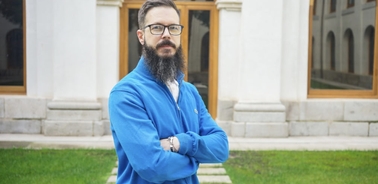Faculty Spotlight: Miguel Vaquero

Meet one of IE’s School of Science and Technology most influential thought leaders.
Students love taking Miguel Vaquero’s classes at IE School of Science and Technology. A native of Spain’s northwestern region of Galicia, Vaquero came to IE following years of research in applied mathematics and engineering at University of California at San Diego. Prior to that he worked at one of Spain’s top research centers, the Institute of Mathematical Sciences (ICMAT), working on invariant manifolds in dynamical systems. The full-time professor says he loves teaching, but still finds time to keep up a lively pace of conference participations and research publications. He has been published in IEEE Transactions on Automatic Control, NeurIPS, the Archive for Rational Mechanics and Analysis and others.
Meet one of IE School of Science and Technology’s thought leaders:
What brought you to IE? Where were you before? And what keeps you here?
When I got the offer to join IE University, the School of Science and Technology was in its nascent stage, and I thought it was a once-in-a-lifetime chance to make an impact at a top university. I saw many opportunities to grow and learn from professionals. Prior to IE, I worked as a researcher at UC San Diego, spending three years in the Mechanical and Aerospace Department under the mentorship of Jorge Cortes. What keeps me here is the abundance of opportunities to explore new endeavors. Unlike many other places, IE continuously provides a stimulating environment.
Where do you work outside of IE and what is most exciting to you about this role in your professional career?
As a full-time professor, I work exclusively at IE and collaborate with individuals outside of IE for research purposes, such as UC San Diego (USA), TU Delft (The Netherlands), and ICMAT (Spain). I believe that working for IE has greatly enhanced my adaptability.
Have you ever had an a-ha moment while teaching that furthered your research? What was it?
Many times! Teaching forces me to deeply reflect on and reconsider the basics. This process is crucial for conveying concepts clearly. Students often bring new perspectives and observations that I had not considered before. As I guide them, I find myself gaining a better understanding of different viewpoints and acquiring additional strategies to tackle research problems.
What book do you wish your students would read before taking your class and why?
There are numerous books that I would recommend to my students. However, if I had to choose just one, it would be Surely You're Joking, Mr. Feynman! by Nobel Laureate R.P. Feynman. In my opinion, this book beautifully portrays how one of the greatest minds of the last century approached life and science. Through his unique way of living, Feynman effectively conveys a wealth of important lessons that I believe can engage and assist students in various ways.
Please name one of your articles or studies you feel addresses the most important issues for 2023?
Very recently, I embarked on a new project that utilizes the combination of machine learning and mathematical models. This topic has gained significant popularity within the community in recent years. The fusion of mathematical models with data-driven methods holds the potential to unlock a deeper understanding of and solutions to some of the most pressing issues of our time.
Whose research of your IE colleagues do you find interesting? Why?
I am intrigued by the research conducted by most of my colleagues. One aspect of IE that I truly appreciate is its strong emphasis on fostering interdisciplinary collaboration. Since my arrival, I have actively engaged in numerous thought-provoking discussions with friends from diverse fields, whose perspectives complement my own research.
Tell us one personal thing about yourself that none of your students know. A hobby, sport or talent? Strange fact? Unusual interest?
I love running and used to be a dedicated long-distance runner during my PhD. Although I took a break for some time, I am now eager to lace up my running shoes again and begin training for a marathon.
